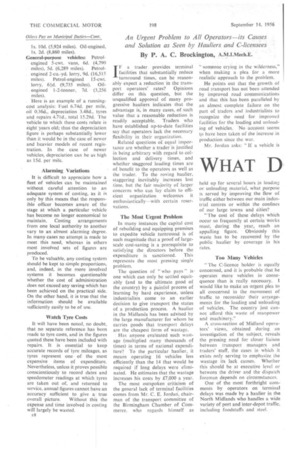An Urgent Problem to All Operators—its Causes and Solution as Seen by Hauliers and C-licensees
Page 98

If you've noticed an error in this article please click here to report it so we can fix it.
By P. A. C. Broekington, A.M.T.Mech.E.
IF a trader provides terminal facilities that substantially reduce turnround times, can he reasonably expect a reduction in the transport operators' rates? Opinions differ on this question, but the unqualified approval of many progressive hauliers indicates that the advantage is., in many cases, of such value that a reasonable reduction is readily acceptable. Traders who have established up-to-date facilities say that operators lack the necessary flexibility in their organization.
Related questions of equal importance are whether a trader is justified in being arbitrary with regard to collection and delivery times, and whether staggered loading times are of benefit to the operators as well as the trader. To the roving haulier, staggering inevitably increases lost time, but the fair majority of larger concerns who can lay claim to efficient organization welcomes it enthusiastically—with certain reservations.
The Most Urgent Problem
In many instances the capital cost of rebuilding and equipping premises to expedite vehicle turnround is of such magnitude that a proof of largescale cost-saving is a prerequisite to satisfying the directors before the expenditure is sanctioned. This represents the most pressing single problem.
The question of "who pays" is one which can only be settled equitably (and to the ultimate good of the country) by a Painful process of learning by hard experience, unless industrialists come to an earlier decision to give transport the status of a production process. A haulier in the Midlands has been advised by the large manufacturer for whom he carries goods that transport delays are the cheapest form of wastage.
Has anyone evaluated such wastage (multiplied many thousands of times) in terms of national expenditure? To the particular haulier, it means operating 16 vehicles less efficiently than the 14 that would be required if long delays were eliminated. He estimates that the wastage increases his costs by £7,000 a year.
The most outspoken criticism of the general lack of terminal facilities comes from Mr. C. E. Jordan, chairman of the transport committee of the Birmingham Chamber of Commerce, who regards himself as "someone crying in the wilderness," when making a plea for a more realistic approach to the problem.
He points out that the growth of road transport has not been attended by improved road communications and that this has been paralleled by an almost complete failure on the part of traders and industrialists to recognize the need for improved facilities for the loading and unloading of vehicles. No accOunt seems to have been .taketi of the increase in production since the war.
Mr. Jordan asks: "If a vehicle is












































































































































































































